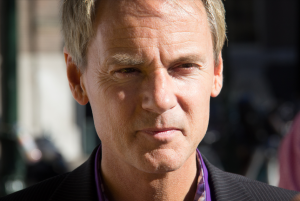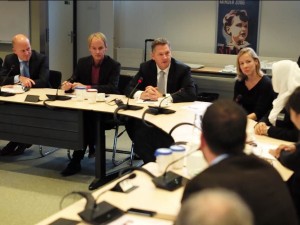“If you’re not at the table, you are on the menu”
Posted on: November 25, 2016, by : Editor
Dutch politician Harry van Bommel has been striving for peace and security in the Arab region for many years. A member of the influential Foreign Affairs Committee, Van Bommel taught as a lecturer before entering the Dutch House of Representatives in 1998. At the start of the 16 Days of Activism to end violence against women, we wanted to talk to Harry about his longstanding interest in the Middle East and North Africa, and what he sees as the role of women in building peace and security in the region,
First we wanted to know what originally motivated his interest in the region. “It began with indignation about the conflict between Israel and the Palestinians,” Harry told us. “This automatically led to a hunger for knowledge about the entire Middle East and Northern Africa. I travelled to many countries in the region and talked to many activists and politicians. This still gives me confidence that one day there will be peace and prosperity in this troubled region.”

While Harry remains positive about the potential of people in the region, he also recognises the difficulties they race. He puts much of this down to fundamental issues dating back to the last century.
“The borders of many countries in this region are drawn by colonial rulers while ignoring natural, tribal and ethnic boundaries,” he notes. “This fact is still one of the main problems. In some countries democratic development has largely been absent and dictatorships were formed. Another problem is the fact that western countries have hardly shown real interest in the developments in this region. Western leaders preferred stable dictatorships over unstable democracies.”
In order to address the region’s problems, Harry views the work of civil society as absolutely essential. “Civil society is of the utmost importance to promote women’s rights and human rights more generally.” Within this, he emphasises the role that women have to play, “women must participate in the democratic process because if you are not at the table, you are on the menu. When new constitutions are written, women must be at the table. When new political bodies are formed, women must be part of it.”
In his recent work, Harry has noted that governments are have drawn anti-terrorism powers so broadly that they can be used to stifle the work of civil society organisations. Harry warned that such a move would ultimately be self-defeating and dangerous, “the abuse of anti-terrorism laws to crack down on the work of civil groups will lead to self censorship and the discouragement of changemakers. The result will be a society that does not include all groups and interests and therefore create instability.”

On the start of the 16 Days of Activism to Eliminate Violence Against Women, Harry wanted to give a message to all the region’s activists.
“The course of history is sometimes changed overnight, but usually it takes a lot longer. Rely on your own strength but do look for partners in the region and elsewhere. Make sure that all over the world you voices are heard through social media and other forms of communications. Be aware of the fact that we are always here to listen to what you have to say.”
___
Follow Harry on Twitter here.
